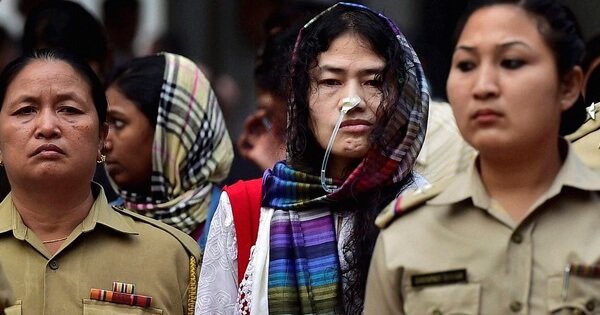Sixteen years is a very long time. Let’s look at it this way, if you were born the year Irom Sharmila started fasting, you would have appeared for your Class X examinations by now. Today, as Irom Sharmila breaks her fast amidst much media attention, it’s time for introspection for a generation of Manipuris. What does this mean to us? After Irom Sharmila’s experiments with non-violence for 16 years, we know one thing loud and clear: nothing has been changed in the Armed Forces (Special Powers) Act (AFSPA).
Today, the debate is not between AFSPA movement and an individual’s choice of means of protest. The question in the collective mind of the people is regarding the legitimacy of non-violence means for achieving a political goal.
In the last six decades, the state of Manipur has struggled with the concept of peace and non-violence. Since the early days of Indian Independence, there were violent armed struggles in the tune of the communist movements, which later became an armed struggle for an independent Manipur. Over this period of time, politicians kept saying that the militants should leave arms and come to negotiation tables.
“Violence will bring nothing” they insisted.
The militants, however, did not pay any heed to the government’s appeal. When Irom Sharmila started her movement against the AFSPA with a strict non-violence stance, she became the symbol hope in a violence-ridden state.
The AFSPA act of 1958, that grants special powers to the Indian Armed Forces in what the act terms terms “disturbed areas”, made our lives a living hell. After the Malom Massacre of 2000, where 10 civilians were shot and killed at a bus stop, allegedly by the personnel of Assam Rifles, Irom Sharmila started her fast against the Act. We heralded her as a hero. Prior to her protest, the AFSPA movement had various twists and turns; initially it was a political movement, later it became a youth movement. Nothing much was coming out of it. Her fast gave some direction to the movement. Soon, people started joining her movement.
Today, after the long struggle of 16 years, Irom Sharmila has broken her fast. What is to become of the movement? Are we to believe that this struggle led to nothing? There are no clear answers to that. But the fact is that Irom Sharmila, as a human rights activist, is free to take any political decision when it comes her crusade against the draconian law.

Many Manipuris,who did not witness the political movement during 1980s and 1990s, will see this historical episode as an attempt to fight the authorities with a wrong weapon. In a widely-circulated cartoon on social media, Bapu consoles Sharmila saying: Satyagraha works against British Law not against Brutal Law. The expression is important because it does not question the limitation of non-violence. It’s important because this struggle now finds itself in an ideological vacuum.
Right now, the people of Manipur have an ambivalent attitude to Sharmila and her decision. Today, our symbol of non-violence fades into the dark alley of electoral politics. However, it’s important to acknowledge her contribution to the movement. The important thing to remember for us is that the act should be repealed as it gives minimum respect to human life. We may even choose someone else as their leader in future. A movement is much bigger than an individual, we must always remember that. It is not Sharmila who made the movement; it is the people who made her the hero of the time.
Eventually, the movement may take another turn. In 2004, Thangjam Manorama was picked up from her home by the Indian paramilitary unit, 17th Assam Rifles on uncertain allegations of being associated with the People’s Liberation Army of China. The next morning, her bullet-ridden corpse was found in a field. We saw widespread protests in Manipur demanding the repealing of the act. The intense protests, which was compounded by a protest in the nude by Manipuri women did lead to some changes. Like the withdrawal of Disturbed Area status from seven assembly segments in Imphal city, the handing over the Kangla which was occupied by Assam Rifles to the people of Manipur and ‘upgrading’ Manipur University to the status of Central University. However, these were really violent protests and we need to ask ourselves if this is the answer we are looking for.
This is a crucial day for Manipur because we stand at a crossroads. Today, Manipur should show the world that it has the maturity to choose the right path. History will judge us if we give up without a struggle.
M C Arunkumar is a professor of social and cultural anthropology with the Manipur University

















